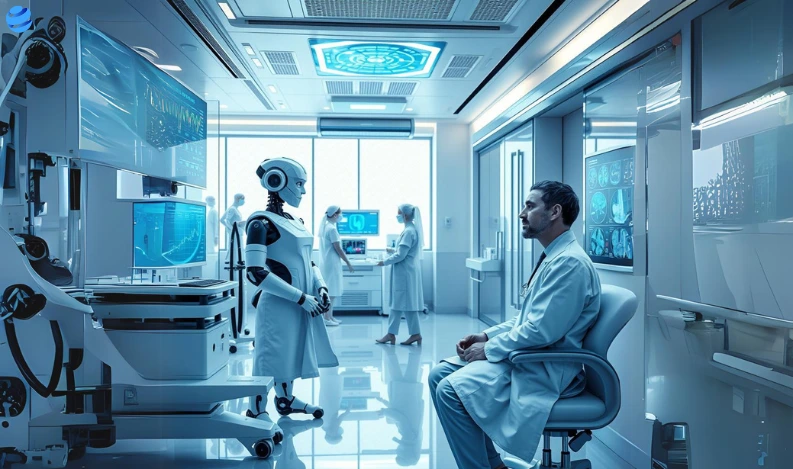Healthcare is transforming rapidly. We now have amazing new tools and technologies that make a big difference in how we stay healthy. One of the most exciting advancements is Artificial Intelligence (AI). AI refers to computer systems that can perform tasks usually requiring human intelligence. These tasks include recognising patterns, making decisions, and learning from experiences. In healthcare, AI is changing the way doctors and nurses work, how we get treated, and how we manage our health. This blog explores how AI is revolutionising healthcare and what it means for our future.
Understanding AI
What is AI?
Artificial Intelligence, or AI, is a branch of computer science that focuses on creating machines capable of performing tasks that would normally require human intelligence. This includes activities such as learning, reasoning, problem-solving, and understanding language. Imagine a very smart computer that can learn and make decisions on its own. That’s AI!
Types of AI
There are different types of AI. Some AI systems can only do specific tasks, like recognising images or translating languages. This is called "narrow AI". Other systems, known as "general AI", are designed to learn and understand any intellectual task that a human can do. While general AI is still in development, narrow AI is already being used in many areas, including healthcare.
AI’s Impact on Medical Diagnostics
Early Detection of Diseases
One of the most important ways AI is changing healthcare is through early detection of diseases. AI can analyse medical images such as X-rays, MRIs, and CT scans. By looking at these images, AI systems can spot patterns that might be too subtle for the human eye to see. For example, AI can help detect cancer at an early stage when it is more treatable. Early detection can save lives and reduce the need for more aggressive treatments later on.
Enhancing Accuracy
AI can improve the accuracy of diagnoses. Traditional diagnostic methods can sometimes lead to errors or missed diagnoses. AI systems, trained on vast amounts of medical data, can help reduce these errors. They can compare a patient’s data with millions of other cases to provide more accurate diagnoses. This means doctors can be more confident in their treatment plans and patients can receive better care.
Personalised Medicine
AI also plays a crucial role in personalised medicine. Personalised medicine means tailoring medical treatment to the individual characteristics of each patient. AI can analyse a patient’s genetic information, lifestyle, and medical history to recommend the most effective treatments. This approach ensures that each patient receives the best possible care based on their unique needs.
AI and Electronic Health Records (EHRs)
Managing Health Records
Electronic Health Records (EHRs) are digital versions of patients’ medical histories. They are essential for modern healthcare but can be overwhelming to manage due to their volume. AI can help manage these records more efficiently. AI systems can sort through vast amounts of data to find relevant information quickly. This helps doctors access the information they need without having to sift through countless files.
Securing Personal Data
One major concern with EHRs is ensuring the security and privacy of personal data. AI can help protect sensitive information by identifying and preventing potential security threats. For example, AI can detect unusual access patterns that might indicate a data breach. This helps keep our health information safe and secure.
Predictive Analytics
AI can also use EHR data to predict health trends. By analysing historical data, AI can identify patterns and trends that help predict future health issues. For instance, AI can alert doctors if a patient is at risk of developing a certain condition based on their health history. This predictive capability allows for proactive care and early intervention.
AI in Hospital Settings
Smart Medical Devices
Hospitals use various medical devices that are becoming increasingly smart due to AI. For example, AI-powered devices can monitor patients’ vital signs in real-time and alert medical staff if something is wrong. These devices can also analyse data to provide insights into a patient’s condition. This helps doctors make quick decisions and provide timely care.
Improving Workflow Efficiency
AI can enhance the efficiency of hospital workflows. For instance, AI systems can manage staff schedules, coordinate patient care, and even assist with administrative tasks. This reduces the administrative burden on healthcare professionals, allowing them to focus more on patient care. Streamlining hospital operations helps ensure that patients receive timely and efficient treatment.
Assisting Nurses
Nurses play a critical role in patient care, but their jobs can be demanding. AI can support nurses by automating routine tasks such as tracking medication schedules and managing patient records. This frees up nurses to spend more time with patients and provide high-quality care. AI can also assist in monitoring patients, providing alerts for any changes in their condition.
AI and Personal Health Management
Health Monitoring Apps
AI technology is also available in health monitoring apps that people use on their smartphones. These apps can track various aspects of our health, such as physical activity, diet, and sleep patterns. AI algorithms analyse this data to provide personalised health recommendations. For example, an app might suggest changes to your diet based on your nutritional needs or remind you to drink more water.
Virtual Health Assistants
Virtual health assistants powered by AI can offer medical advice and support. These assistants can answer questions about symptoms, provide information on treatments, and even offer mental health support. They are available 24/7, making it easy for people to get help whenever they need it. Virtual health assistants can be especially useful for answering common health queries and guiding users on when to seek professional medical care.
AI in Telemedicine
Telemedicine involves providing medical care remotely using technology. AI enhances telemedicine by offering tools that can analyse patient data during virtual consultations. For instance, AI can evaluate the severity of symptoms based on a patient’s description and provide recommendations for further action. This helps doctors make informed decisions even when they cannot see the patient in person.
The Future of AI in Healthcare
Advancements in AI Technology
The future of AI in healthcare looks promising. Advances in AI technology will continue to improve diagnostics, treatment, and patient care. For example, AI is expected to become even more proficient at analysing medical data and predicting health trends. These advancements will lead to more accurate diagnoses and personalised treatment plans.
New Research and Treatments
AI will also play a significant role in research and developing new treatments. By analysing large datasets, AI can identify new drug candidates and test their effectiveness. This accelerates the process of discovering and bringing new treatments to market. AI-driven research will lead to innovative therapies and better outcomes for patients.
Global Health Improvements
AI has the potential to improve healthcare globally. In areas with limited access to medical resources, AI can help provide essential care and support. For example, AI-powered diagnostic tools can be used in remote locations to help identify health issues. This can help bridge the gap in healthcare access and provide support to underserved communities.
Challenges and Considerations
Privacy and Security
One of the main challenges with AI in healthcare is ensuring the privacy and security of personal health information. As AI systems handle large amounts of sensitive data, it is crucial to implement strong security measures. This includes protecting data from unauthorised access and ensuring that AI systems comply with privacy regulations.
Ethical Concerns
AI in healthcare also raises ethical concerns. For instance, there are questions about how AI systems make decisions and whether they can be biased. It is important to ensure that AI is used ethically and that its decisions are transparent and fair. Ongoing research and regulation are needed to address these concerns and ensure that AI benefits everyone.
Integration with Existing Systems
Integrating AI with existing healthcare systems can be challenging. Healthcare providers need to adapt to new technologies and workflows. Training and support are essential to help medical professionals use AI effectively. Smooth integration is crucial for maximising the benefits of AI in healthcare.
Conclusion
AI is revolutionising healthcare in many exciting ways. It is enhancing diagnostics, personalising treatments, and improving the management of health records. AI is also making hospital operations more efficient and supporting personal health management through apps and virtual assistants. The future of AI in healthcare holds even more promise, with advancements in technology leading to better care and new treatments.
Despite the challenges, the benefits of AI in healthcare are significant. As technology continues to evolve, AI will play an increasingly important role in helping us stay healthy and receive the best possible care. Embracing these innovations will lead to a brighter future for healthcare, where technology and human expertise work together to improve our lives.
You may also like:-
























linda
This article is such an eye-opener! I never realized how much AI is already impacting healthcare. It’s amazing to see how technology is being used to not only speed up diagnosis but also to provide better care for patients. I do wonder, though, how safe it is to rely so heavily on machines. Will doctors still play a crucial role, or are we moving toward a future where AI takes over completely? 🤔 Great read, though! It got me thinking about the future of healthcare.